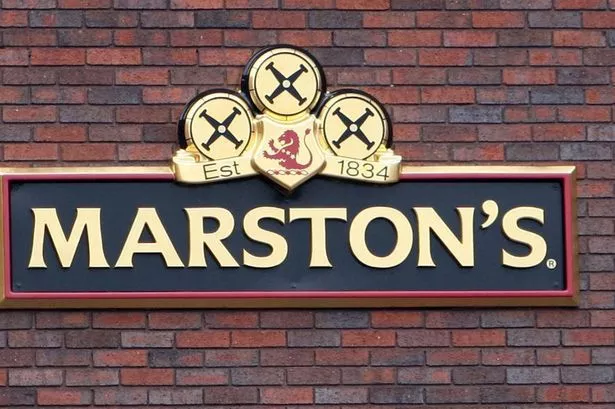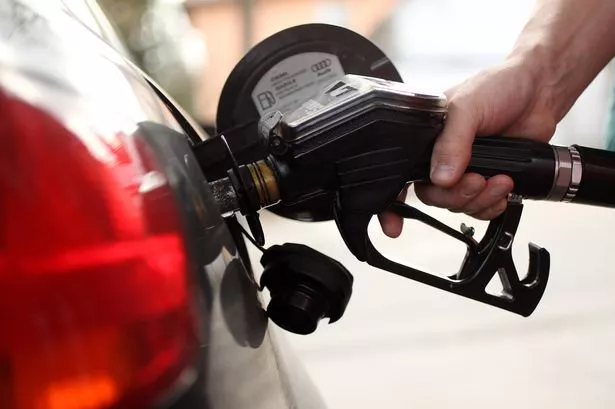
Marston's profits jump 64% as pre-Christmas bookings offer hope for bumper year
Marston's, the esteemed pub operator headquartered in Wolverhampton, has reported a robust performance that exceeded market expectations, buoyed by pre-Christmas bookings and signalling potential for another prosperous year. The company announced this morning that its total revenue for the year ending 28 September, 2024, climbed to £898.6 million, marking a three per cent increase from £872.3 million in the previous 12 months, as reported by City AM. Pre-tax profits at Marston’s surged by an impressive 64.5 per cent, rising from £25.6 million to £42.1 million, while earnings before interest, taxes, depreciation, and amortisation (EBITDA) saw a 13 per cent uptick. Justin Platt, Marston’s chief executive, described the period as a "defining year" for the firm, which followed their strategic move away from brewing to "embark on a new chapter". The group, which boasts ownership of over 1,339 pubs across the UK, had divested its 40 per cent share in Carlsberg Marston’s Brewing Company (CMBC) back to the Danish brewer for £206 million in July. Platt commented on the sale's significant impact: "The sale of our stake in CMBC has been transformational, enabling us to significantly reduce debt, increase our flexibility and focus on what we do best: running great local pubs." He highlighted the positive outcomes of their focused approach and refreshed strategy, which are reflected in the strong financial results, including a 4.8 per cent rise in like-for-like sales that outpaced the market. Additionally, Marston's net debt was reduced to £883.7 million, indicating a substantial decrease of over £301.7 million. Looking towards the festive season, the current trading period leading up to Christmas is showing promising signs, with bookings already surpassing those of the previous year.

Manchester Airport owner reports record passenger numbers - but warns of challenges ahead
Manchester Airports Group (MAG), which encompasses Manchester, London Stansted, and East Midlands airports, has flown to new heights with its pre-tax profit hitting £139.6m for the first half of their financial year ending on 30 September, 2024. This marks an increase from the previous £115.9m, buoyed by a 6.9% rise in traffic to 37.3m passengers, as reported by City AM. MAG's success story also includes its subsidiary travel services business CAVU contributing to a revenue surge to £768.5m from £705.6m. Notably, Manchester Airport celebrated a milestone, managing 17.8m passengers during this period and reaching an unprecedented annual total of 30 million travellers in September for the first time ever. In comparison to international counterparts such as La Guardia New York and Melbourne Airport Australia, Manchester Airport establishes its stature by entering their league. Meanwhile, London Stansted broke its own record for passenger numbers in a half-year with 16.7m visitors. MAG also witnessed its busiest day on record during October when it serviced 107,000 passengers within a single 24-hour timeframe. Additionally, East Midlands Airport saw a steady flow of 2.8m individuals over the six months. Despite facing increased taxes and operational costs, MAG CEO Ken O'Toole highlighted the group's achievement stating: "Across the summer, one in five UK air passengers chose to fly through a MAG airport for business, leisure, to study or visit friends and family." "This is testament to the strength of our route networks, our commitment to providing great choice and value to all our customers, and to always striving to deliver a positive passenger experience." "While our industry faces challenges both in the UK and globally, such as increasing taxation and rising costs linked to the push towards full decarbonisation of air travel, MAG’s strong financial and operational performance makes us well-placed to drive forward our investment programmes as we continue to grow."

Mothercare slumps to loss as Middle East markets continue to struggle
Mothercare has reported a slide into the red for the first half of the year, with difficulties in its Middle Eastern markets being a significant factor. The company recorded an adjusted pre-tax loss of £1.4m for the six months ending in September, a stark contrast to the £1.8m profit from the same period last year. Global sales dropped by 12 per cent, attributed mainly to sluggish sales in the Middle East, as reported by City AM. "Performance in our Middle Eastern region, especially in our largest single market, remains challenging where the shape of our partner’s retail offering in the country continues to adapt to address evolving consumer behaviour, pursuant to ongoing fiscal and legislative changes," said Clive Whiley, Mothercare's chair. The retailer also faced challenges as franchise partners cleared out old stock. However, Whiley highlighted a positive development with the establishment of a £30m joint venture in South Asia with Reliance Brands, India's largest private sector corporation. Mothercare has managed to reduce its secured debt facilities to £8m and has received £16m from Reliance Brands. This new partnership is set to encompass markets including Nepal, Sri Lanka, Bhutan, Bangladesh, and India. Chief executive Daniel Whiley said the new India joint venture and refinancing had given the company a fresh start. "We have immediately utilised this new India joint venture and refinancing as a springboard for a de-leveraged Mothercare to explore the full bandwidth of growth opportunities through connections with other businesses, the development of our branded product ranges and licensing within and beyond our existing perimeters," Whiley added.

Marie Claire and Go Compare owner sees profits dip but returns to revenue growth
Publishing giant Future Plc has reported a dip in profits for the financial year but saw its revenue return to growth over the period. The Bath-based company, which owns brands including Marie Claire, Country Life and Go Compare, said it had made "good strategic progress" over the year ended September 30. Adjusted operating profit at the firm was £222.2m - down from £256.4m the year before. Revenues were broadly flat at £788.2m, with +1% organic growth. UK revenue grew by 6% on an organic basis, with "very strong growth" in Go.Compare, the company said on Thursday. Future reported business-to-business growth of +2% although business-to-consumer saw a 6% decline, impacted by market conditions and the weight of magazines. Meanwhile, the company's US revenue fell by 6% on an organic basis. Future said profitability remained in line with expectations. Jon Steinberg, who is stepping down as Future's chief executive next year, said: “We launched our Growth Acceleration Strategy one year ago and have made good strategic progress. We have invested in sales and editorial roles, successfully diversified and grown revenue per user, and we have further optimised our portfolio. "Importantly, the group has returned to organic revenue growth during the year, underpinned by a strong H2 performance. The execution of our strategy combined with our strong financial characteristics, including a flexible cost base and highly cash generative profile, creates further optionality and positions the business well." The announcement comes a year after Future launched its Growth Acceleration Strategy in a bid to capitalise on opportunities in "attractive and growing markets". The business said two-year investment programme of £25m-£30m had helped it return to growth.

Why UK diesel and petrol prices are still sky high despite recent fall
Between June and October 2024, the price of petrol and diesel in the UK fell, but retailers' margins from each pump visit have significantly increased. The Competition and Markets Authority (CMA) attributes this decrease in fuel prices to changes in crude oil prices and refining spreads, both influenced by global factors, as reported by City AM. According to the watchdog, average petrol and diesel prices at the end of October were 134.4 and 139.7 pence per litre respectively, a decrease of 10.0 ppl and 10.4 ppl compared to the previous four months. Despite this drop, retailer margins remain at historic levels. The CMA's data reveals that supermarket fuel margins rose from 7 per cent in April to 8.1 per cent in August, while non-supermarket fuel margins also increased from 7.8 per cent in April to 10.2 per cent in August. The authority expressed concern over the rise in fuel margins, suggesting that competition in the road fuel retail market remains weak. The CMA also examined the retail spread - the average price drivers pay at the pump versus the benchmarked price retailers purchase fuel at - from July to October 2024. Retail spreads were above the long-term average of 5-10 ppl, with petrol averaging 14.9 ppl and diesel averaging around 16.3 ppl. The watchdog highlighted that retail spreads have been above long-term averages since 2020, "indicating an ongoing lack of retail competition in the sector." Dan Turnbull, senior director of markets at the CMA, commented: "While fuel prices have fallen since July, drivers are paying more for fuel than they should be as they continue to be squeezed by stubbornly high fuel margins." "We therefore remain concerned about weak competition in the sector and the impact on pump prices." "With that in mind, we are pleased the government is progressing with our recommendations."

Industry Professionals Decry Cancellation of Extra Bank Holiday in 2025
A recent announcement from Number 10 has confirmed that the proposed extra bank holiday in 2025 has been cancelled. Initially, there were speculations that an additional day off would be added to commemorate the conclusion of WWII, but this has been officially declared as not happening. Leaders in the UK's hospitality industry have expressed their disappointment with the government's choice to abandon the extra bank holiday. They argue that such days are crucial for generating additional revenue in their sector. Their sentiments mirror those from 2022, advocating for the permanent inclusion of an extra bank holiday to celebrate the late Queen's Platinum Jubilee. Martin Williams, a former figure in the M Restaurants and Gaucho group, has described the decision to cancel the 2025 holiday as "missed potential." Williams stated: "The additional bank holiday would have been a vital stimulus for the hospitality sector amidst the economic challenges posed by the recent budget. Local pubs and independent eateries would have greatly benefited from it—a missed opportunity indeed." A representative from UKHospitality told City AM: "Bank holidays are peak times when people in Britain prefer to dine out or take a mini-break, which naturally leads to an increase in sales for hospitality businesses. As the industry grapples with rising costs, high-demand periods like bank holidays, Easter, and summer vacations become even more significant for driving sales." A spokesperson for the Campaign For Real Ale added: "Bank holidays are golden opportunities for the beer and pub sector. They offer an additional day of support for public houses, social clubs, and taprooms seeking to enhance their business." "The pub industry continues to face financial hurdles, including soaring energy bills and escalating costs. CAMRA’s data indicates that pub enterprises are experiencing unprecedented turnover rates and are still confronting a severe decline in the number of licensees able to maintain their operations in the UK. “Public houses are essential for community unity, offering inviting spaces for social engagement and aiding in the fight against loneliness. They remain central to our neighborhoods, and bank holidays are an excellent occasion for people to gather at their local pub to enjoy a pint with loved ones.” The economic impact of additional bank holidays is significant, with most of the private sector ceasing operations for an extra day. Studies suggest that an extra bank holiday could cost the UK economy approximately £2.4 billion. A spokesperson for Number 10 remarked: "The 80th anniversaries of VE and VJ Day will be monumental occasions for our nation, as we unite to honor the memories of those who served and the legacy they have left us. "We are dedicated to commemorating these significant national events with the appropriate respect, which is why we have allocated over £10 million for events to mark these anniversaries.”